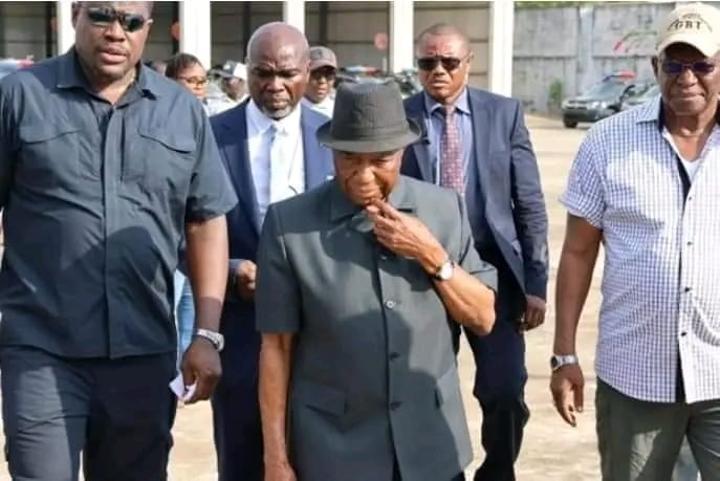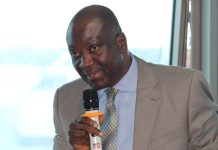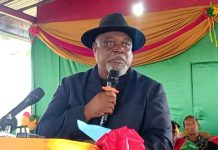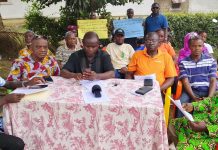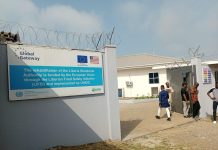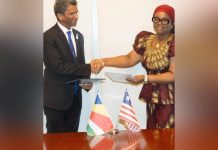Africa-Press – Liberia. The Boakai Administration outlined what it said were successes in the 100-Day Action Plan on Friday, May 17, despite opposition claims that it was a complete failure.
Monrovia, Liberia, May 21, 2024—The Government of Liberia under President Joseph Nyuma Boakai is upbeat about implementing 100 percent of all sectors cataloged in its ambitious 100-Day Deliverable or Action Plan and has already begun rolling out successes.
The administration says the strategic design of the 100-Day Action Plan was based on a deep understanding of the current governance and microeconomic situation and challenges that required immediate action.
Rooted in the vision of the ruling Unity Party Alliance (UPA) campaign manifesto and its Agriculture, Roads, Rule of Law, Education, Sanitation and Health, Tourism (ARREST) framework, it explains that the 100-Day Action is based on findings not only from a Joint Presidential Transition Teams’ engagements across all sectors, but also diverse technical engagements and coordination meetings held with all MACs and Development Partners.
The document is a product of a multi-agent engagement process, and it is being coordinated through a structured coordination mechanism headed by a National Steering Committee chaired by the President.
With US$23,488,543 appropriated to implement the 100-Day Action Plan, targets range from accelerating the fight against corruption, making primary roads pliable in all seasons, fighting drugs and substance abuse, and training 10,000 youths in ICT across the country.
Though not fully implemented despite the elapse of the first 100 days of the Boakai administration, the government report points to successes in several key sectors, with some interventions just commencing while others are yet to kick off. The goal is to create immediate relief for the Liberian population by making interventions in critical priority sectors.
For instance, in the Agricultural sector, the government says it has concluded the National Agricultural Census and data collection exercise, with analysis ongoing. It has also drafted a National Agriculture Development Plan that is awaiting validation, including securing a budgetary seed fund. The food security strategy is at 95 percent completion, among other things. The Ministry of Agriculture is cultivating 1000 hectares of lowland at Fuamah Multipurpose Cooperative in Bong Mines, Bong County.
[bsa_pro_ad_space id=1]
In the area of infrastructure, government says it is committed to ensuring that all major roads across the country are pliable all seasons and is carrying out General Road Users Worthiness Motor Vehicle and Driver Licensing, Insurance, Eligibility Certification Enforcement Exercises nationwide with Critical Road corridors already identified across Liberia, while road contracts are being awarded and contractors received initial disbursement of funds, and that critical spots across the country currently being aggressively worked out in anticipation of the rainy season that is already here. These are in addition to grading and reshaping to form road camber and compaction and installing a cross drain at the water crossing.
In the sector of rule of law, government says it has disbursed US$200,000 towards the ongoing fight against illicit substances and is committed to eradicating trade and use of illegal substances in the country, besides massive ongoing community engagements and awareness in 21 schools with 21 ghettos raided in Montserrado County and more than 200 suspected drug dealers detained, including notorious individuals, who are facing prosecution.
In the Education Sector, the Boakai administration has allotted US$579,119 to pay arrears for both local and international scholarship students. This includes underwriting expenditures such as monthly allowances, resettlement assistance, French language training programs, air ticket costs, and other administrative and operational costs associated with students’ well-being.
From the academic year 2022/2023 to the academic year 2023/24, 3,350 students benefit from local scholarships, 283 of whom are at the graduate level, 2,903 at the undergraduate level, and 164 at associate degree programs. Additionally, $3,500,000 has been appropriated in the FY2024 budget to pay WASSCE fees.
This is besides a commitment to invest in Youth Capacity Building in ICT for the first six months that have already been launched and to complete the ongoing construction of 25 schools across the country.
For More News And Analysis About Liberia Follow Africa-Press

